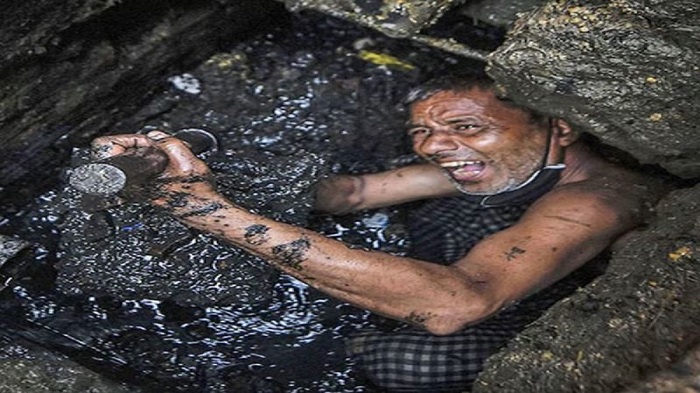The Deaths of Manual Scavengers Demand Justice, Not Silence
(Asian independent) 23 May 2025, New Delhi, India — At a time when the government continues to claim that manual scavenging has been eradicated, the recent spate of preventable deaths of sewer and septic workers across the country reveals a devastatingly different truth — one marked by impunity, systemic caste violence, and institutional neglect.
On February 2, 2025, two sanitation workers died and another was critically injured while cleaning a sewer near Mansa Devi Apartments in Narela, Outer Delhi. The men, hired by a private contractor, were made to descend into a toxic pit without any safety equipment. Days later, on the same morning, three more workers—Farzem Sheikh, Hashi Sheikh, and Suman Sardar—all from Murshidabad, West Bengal—died while cleaning a clogged drain in the Bantala area of the Kolkata Leather Complex. The workers, engaged by the Kolkata Metropolitan Development Authority (KMDA), were reportedly swept into a manhole after a pipe burst, leading to their tragic deaths. Their bodies were recovered hours later by police, fire services, and disaster response teams. The Mayor of Kolkata, Firhad Hakim, attributed the cause to toxic gas accumulation from industrial discharge and announced an inquiry. Yet such enquiries rarely lead to convictions or reform.
These deaths occurred just four days after a Supreme Court order (January 29, 2025) which categorically banned manual scavenging and hazardous cleaning of sewers and septic tanks in India’s major metropolitan areas, including Delhi, Mumbai, Chennai, Kolkata, Bengaluru, and Hyderabad. The bench, led by Justices Sudhanshu Dhulia and Aravind Kumar, was ruling on a petition filed by Dr Balram Singh.
Despite this landmark ruling, fatal incidents continue to be reported with alarming frequency:
A Pattern of Death and Silence Across India
Tiruppur, Tamil Nadu (May 19, 2025): Three Dalit workers—Saravanan (30), Venugopal (30), and Hari Krishnan (27)—died after inhaling toxic gas while cleaning a sewage tank at Alaya Dyeing Mills. A fourth worker remains hospitalised. The accused include the factory owner, manager, and supervisor, booked under sections of the Prohibition of Employment as Manual Scavengers and their Rehabilitation Act, 2013, the SC/ST (Prevention of Atrocities) Act, and the Bharatiya Nyaya Sanhita (BNS).
Khandwa, Madhya Pradesh (April 3, 2025): Eight men died in Kondavat village after inhaling toxic gas while cleaning a well before the Gangour festival. The police investigations are ongoing.
Faridabad, Haryana (May 21, 2025): One labourer died while cleaning a septic tank in Sikri village’s Harijan Mohalla; the landlord of the house also died in an attempt to rescue the victim. No FIR was filed, and police stated that “no complaint” had been received. The incident was dismissed as “inquest proceedings”.
Ahmedabad, Gujarat – Danilimda (May 16, 2025): Three contract workers—Prakash Parmar, Vishal Thakor, and Sunil Rathva, all approximately 20 years old—died after inhaling toxic fumes while cleaning a septic tank inside a garment factory in the Danilimda area. The factory had been closed for a year, and cleaning was being undertaken ahead of its reopening. The workers were employed by a private contractor. The incident occurred on the morning of the second day of cleaning. A fourth worker survived. Authorities confirmed that no safety protocols were followed, and the case is under investigation.
20 manual scavenger deaths are reported from February 2025 to May 2025.
According to data, nearly 92% of sanitation workers belong to Scheduled Castes, Scheduled Tribes, or Other Backward Classes. These deaths are not just accidents — they are a direct result of structural casteism, economic exploitation, and deliberate neglect.
Despite the clear legal prohibition under the Prohibition of Employment as Manual Scavengers and their Rehabilitation Act, 2013, and constitutional protections under Article 21 (Right to Life) and Article 17 (Abolition of Untouchability), governments and private entities continue to flout the law with impunity.
We, Dalit Adivasi Shakti Adhikar Manch (DASAM), call for urgent and decisive action to address the continued and preventable deaths of manual scavengers in India. We demand the immediate registration of FIRs in all recent fatalities under the applicable legal provisions, including Section 9 of the Prohibition of Employment as Manual Scavengers and their Rehabilitation Act, 2013; Sections 106(1), 125A, and 194 of the Bharatiya Nyaya Sanhita; and Sections 3(1)(r) and 3(2)(v) of the Scheduled Castes and Scheduled Tribes (Prevention of Atrocities) Act. Each incident must be subject to an independent, time-bound judicial inquiry with full transparency and public disclosure of findings. We further call for a minimum compensation of Rs 30 lakh to the families of the deceased, along with comprehensive rehabilitation measures, including access to housing, education, and employment opportunities for dependants. To ensure compliance with the Supreme Court’s ruling of January 29, 2025, we urge establishing a central oversight body and the immediate revocation of licences for all contractors and agencies found in violation. Additionally, we demand a nationwide audit of sanitation work practices, with particular attention to private enterprises and urban local bodies, and a complete ban on sub-contracting such work to unregulated and unaccountable labour intermediaries. These measures are not merely remedial—they are necessary steps toward upholding constitutional rights, ensuring legal accountability, and affirming the dignity and humanity of all sanitation workers.
We cannot afford a situation where deaths in sewers are met with silence, not justice. These workers are not invisible cogs. Their lives are not expendable. Their deaths are not inevitable. We stand in unwavering solidarity with the families of the victims and demand that their names not be forgotten, their stories not be buried, and their culprits—whether individuals or institutions—be held to account.
This is not a matter of charity. It is a matter of constitutional duty, legal obligation, and human dignity.
Issued by: DASAM








